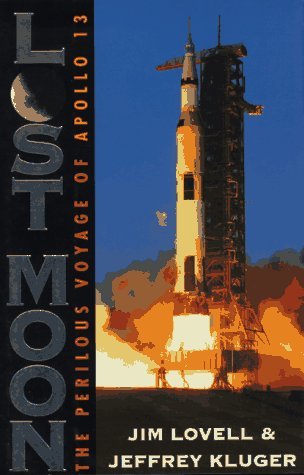
Rating: 5 Stars
Read this one in one afternoon, could not put it down!
First and most importantly, I have always been a little obsessed with the story of Apollo 13. I recently read 'Failure is Not an Option' by Gene Kranz, who you might recall was on duty at Mission Control at the time that Apollo 13 experienced that first explosion that would bring three men in space dangerously close to death. Both books are fantastic and offer great insights into the same story, albeit with very different experiences. This one has been on my to-read list for quite a while, but something was always stopping me from reading it. I wanted to, so badly. However, Apollo 13 has long been one of my favorite movies from childhood and I was terribly afraid that if I were to read Jim Lovell's account of what actually happened, I'd be sorely disappointed to find out Tom Hanks lied to me and the story didn't go as depicted. But eventually my need to know all things Apollo 13-y, I decided to dive right in.
I was NOT disappointed. Not in the least.
Something I enjoyed that I didn't realize I would, is that we are not only given the play-by-play account from The Man himself, Jim Lovell, but were also taken back to his early days in the program - and even further back to see how his love of rockets began. It also looks at his time in college and then finally joining the space program and its early days. He then recounts for the reader the tragic event of Apollo 1 that could easily have derailed the entire program forever.
This is just as much a biography of Lovell as it is a biography of the doomed mission that will always be recognized by the now-famous line, "Houston, we have a problem." As an aside, I always hear the line in my head as "Houston, (dramatic pause) we have a problem" but time and again when I watch the movie I am reminded it is a line that rolls easily off Hanks' tongue as if it were just any other old piece of dialogue and when the alarms are going off, it is just a quick run-together of, "Houston we have a problem" with more of the emphasis on 'problem'. Also, as it is told in the book, the sentence Lovell ACTUALLY said was, "Houston, we've had a problem." Maybe this kind of stuff is only interesting to me, but I can see why the line was altered a little. The past tense doesn't make it sound nearly as dire or desperate. So, there's a little Hollywood meddling for you.
But anyway, as I was saying, I was very happy as I read to find that much of what actually occurred was to be found in the movie. Now naturally there was no way to account for and portray every character, and Mattingly (Gary Sinise) played a much bigger role in the movie it seemed than the book, but the movie really did a great job of telling the story without compromising for Hollywood. As I was reading, scenes from he movie would be playing in my head as I read something I was familiar with and it was nice to see that mirror image. As Swigert got the call to stir the tanks, I found myself shouting at him not to. Sadly, he could not hear me!
One thing that I always enjoyed from the movie was the scene where Tom Hanks finally gets annoyed with the NASA doctor and rips off his electrodes so he is no longer being monitored. This scene was totally anti-climactic in real life and was done with little fanfare, and not much freaking out by those in Houston. In real life, he removed the electrodes and it took a few minutes for Lovell to even be asked about it, to which he simply responded that he no longer had them on. That's that.
Additionally, on the inside covers Lovell chose to include a diagram detailing the Aquarius and Odyssey and their components, as well as a step by step timeline of events as they occurred. Appendix A goes into further detail about the Mission timeline, and the remaining two Appendices then detail NASA employees both involved in the Apollo 13 rescue, and all manned Apollo missions before and after.
I highly recommend this one, whether you have an interest in space or not. It is about so much more than that. It is about the struggle to survive against the odds, to trust those who are thousands of miles away, but might as well be millions, to do their job and bring you home. It is told in such a way that the reader does not feel they have to be a rocket man to understand what is going on. Even at its most technical, I was not overwhelmed by the vast amounts of technology and jargon - and a lot of lines said in the movie now make a lot more sense - gimbal lock, anyone?
P.S. If you don't love Tom Hanks, you might be a terrorist.
No comments:
Post a Comment
Thanks for visiting my little book nook. I love talking books so leave a comment and let's chat!